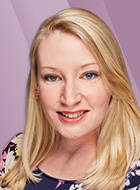
Location
Cincinnati, OH, USA
Term of office on council:
2021-2024 First Term
Stephanie Kinnan is the Senior Managing Editor, Publications for the American Society for Gastrointestinal Endoscopy. She received her master’s degree from The University of Chicago where she focused her studies on publication ethics. She previously served on the Board of Directors of the International Society of Managing and Technical Editors and spent four years as the Editor-in-Chief of Editorial Office News (EON). In addition to her appointment to COPE Council, in 2021, she began a term as Chair of the EON Editorial Board. Stephanie is also the author of a best practice guide for ethical publishing and has written several academic articles related to the field of scholarly publishing. ORCID: https://orcid.org/0000-0001-7587-7307
2023 competing interest statement for Stephanie Kinnan (PDF)
Getting to know you
An interview with Stephanie Kinnan
What path has your work, studies or research taken that has led you to your position on COPE Council?
I have had an interest in publication ethics since the beginning of my career in scientific publishing. For the completion of my master’s degree at The University of Chicago, I wrote a best practice guide in publication ethics for both editorial professionals and academic researchers. Throughout my career and studies, COPE has always been an essential resource for ethical guidance, and I am excited to be a part of a community that is developing and shaping ethical best practices in the publishing field.
What are the most common publishing ethics issues you and your colleagues have faced?
In recent years, the management of conflicts of interest (COIs) has been a particular challenge faced by myself and colleagues. The industry has become very aware of the influence that COIs can have in academic research, but standardization in defining and collecting COIs is lacking. Research completed by my colleagues has shown that many, if not most, of our authors are not properly nor fully disclosing their conflicts. My team and I are currently overhauling our COI collection practices to address this issue.
Are there any publication ethics issues you are experiencing that are changing at speed?
I think that rapid technological advancement over recent years has made ethical oversight in scholarly publishing incredibly challenging. There are so many tools and platforms that have been developed to help disseminate research (eg, social media, editorial software, preprint servers). Unfortunately, these also create ethical pitfalls for authors and editors. Publications are constantly fighting an uphill battle to adapt to this ever changing field and uphold ethical standards.
Are there any ethics issues which seem unique or more common in your field, in your experience?
Image and video manipulation is a particular area of growing concern across all of scholarly publishing, especially for those of us in visual-dependent fields. Advances in endoscopy, for example, rely heavily on the images and videos taken during procedures. Many journals now even use graphical or video abstracts. As the use of visual components in articles continues to grow, it will be important to continue to develop ethical guidelines on image and video manipulation and acceptable usage.
What do you feel is the most pressing challenge currently facing academic publishing?
I think the biggest and most urgent challenge when it comes to publication ethics is education. Universities should require classes on publication ethics for future researchers. Editorial professionals should be receiving a base education on ethical standards when entering the field. I think a quick-reference, easily accessible beginner’s guide for both editorial professionals and authors (eg, Publication Ethics for Dummies) would go a long way in developing ethical standards for early career professionals. Much of the unethical behavior we see in scholarly publishing comes from a simple lack of knowledge or understanding of ethical best practices, especially as ethical policies can vary greatly among different countries, academic disciplines, and journals.
What are you hoping to get your teeth into at COPE? Are there any projects in particular you would like to get involved in, or any initiatives you have in mind?
I joined COPE to further my own knowledge about publication ethics and to help educate my fellow editors and authors about ethical best practices. I am excited to have a hand in shaping these standards, and I am looking forward to having the opportunity to analyze and untangle complicated ethical cases that will help us provide more detailed and structured guidance for those in the scholarly publishing field in the future.
Photo copyright unknown